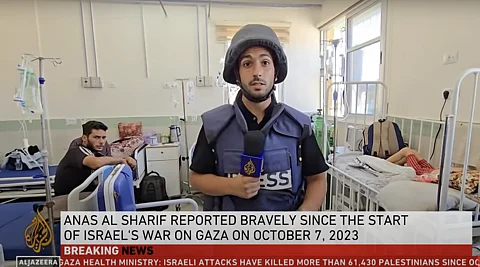
- Home
- NewsGram USA
- India
- न्यूजग्राम
- World
- Politics
- Entertainment
- Culture
- Lifestyle
- Economy
- Sports
- Sp. Coverage
- Misc.
- NewsGram Exclusive
- Jobs / Internships

It’s impossible to be a journalist and remain unaffected by Israel’s continued murder of journalists — part of its campaign to kill as many Palestinians in Gaza as it possibly can. On August 10, Anas Al Sharif — whose reporting I’ve followed sporadically through translations on social media since October 7, 2023, and who won Amnesty’s Human Rights Defender award last year — was killed along with three other Al Jazeera journalists and two freelance journalists. They were staying in a tent for journalists pitched opposite the Al-Shifa hospital. It was a targeted assassination: Israel has admitted as much, claiming, as pathetically as ever, that its latest victim was a member of Hamas.
It’s impossible to remain unaffected, I said earlier — but some journalists are managing that just fine. Here’s the BBC unquestioningly parroting Israel’s claim. And here’s Reuters, doing the same:
Reuters has since changed the text of its story. This screenshot, of the article’s second paragraph, was one of several captured by diligent Twitter users, and it begins as if Reuters knew for a fact that Al Sharif was the head of a Hamas cell. Note that the initial part of the sentence doesn’t appear in quotes, which, when dealing with such utterly specious material, is unforgivable. In fact, the words “Al Sharif was the head of a Hamas cell” come almost verbatim from an IDF tweet; to take them out of quotes is journalistic malpractice.
It’s also unforgivable for journalists not to call out a lie when they’re fed one. None of the West’s leading publications have summoned up even an ounce of skepticism at Israel’s relentless campaign to paint all the journalists it kills as members of Hamas, even though, by now, more media workers have been killed in Gaza than in both World Wars combined. This data is not from Hamas; it’s from the Watson School of International and Public Affairs at Brown University. In the US.
Part of the reason the BBC, the New York Times, and other outlets haven’t howled in protest at these murders is because they can get off on a technicality. They aren’t allowed into Gaza to report, so they aren’t able “to independently verify” whether these slain journalists were indeed members of Hamas. (This is, of course, why Israel doesn’t allow reporters into Gaza.) But the truth also is that the color line is alive and well in Western journalism — in all these outlets that otherwise self-righteously shout about the First Amendment, freedom of the press, and the importance of the fifth estate.
In the wake of the Holocaust and the founding of Israel, the West brought into its white fold a group of people it didn’t formerly consider white at all: Jews. (In this book, the American rabbi Michael Lerner says that Jews have, in the past, been “the primary ‘Other,’ have been socially and legally discriminated against, have been the subject of racism and genocide, and in those terms Jews are not white.” To which the Black academic Cornel West argues that Jews have since attained “white-skin privilege.” Some of these historical dynamics I’ve absorbed from conversations with friends and colleagues, not least the redoubtable Pankaj Mishra.)
The conflict between Israel and Palestine should be framed more often as a conflict between (newly deemed) white people and (always and forever) brown people. When that is the framing, it’s simpler to see why the West falls behind Israel uncritically every single time, even when Israel is flouting the principles that the West preens about all the time. Like media freedom.
Just as the slaughter of brown and Black people doesn’t matter very much to Western governments, so too the targeted killing of brown and Black journalists doesn’t matter very much to Western publications.
In any case, to most editors in London and New York, these journalists are only ever good enough to stay in their lanes and cover their own backyards — and or to be shrunk to the status of a “fixer” when there’s a foreign correspondent available to parachute in.
In death, a brown journalist will find Western champions only if they work for a Western publication or if their death can be leveraged for political point-scoring. Jamal Khashoggi, the Washington Post writer sliced up by Saudi Arabia in its embassy in Istanbul in 2018, fulfilled both criteria. Anas al-Sharif, a brown man reporting in Arabic for an Arabic outlet during an assault by Israel, fulfilled neither. [Global Voices/VP]
Also Read:
